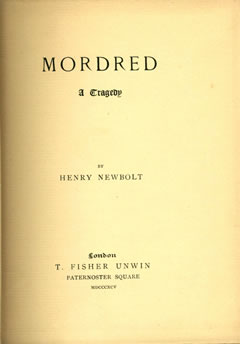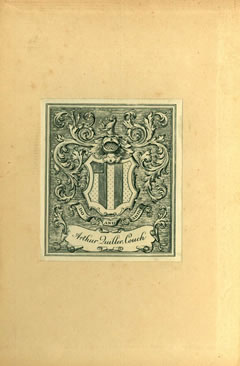Mordred: A Tragedy
You may click on the thumbnail images to view them full screen


Newbolt, Henry. Mordred: A Tragedy. London: T. Fisher Unwin, 1895. (This copy has the bookplate of Arthur Quiller-Couch.)
The play Mordred by British poet Henry Newbolt (1862-1938) was influenced by Malory and Tennyson. The story of Pelleas and Ettarre becomes an important element in Newbolt's plot. In the play, though Arthur feels bound by justice to condemn his nephew Gawain for his betrayal of Pelleas, he is convinced not to do so by Mordred. Arthur's decision is influenced by Mordred's subtle threat to reveal the story of his own birth. Fearing that the knowledge of his incestuous affair would destroy the Order that he has established, Arthur betrays his principles, an act that leads to Guinever's turning from him since it was his adherence to his ideals that she most admired. Almost as if in response to Tennyson's portrayal of her, she says to Lancelot, 'Shall he be pure / And Guinever break troth' and proclaims that while Arthur is king of himself, 'no less will I be queen' (19). But when he is no longer the blameless king, she is without the moral example that keeps her true to him. Arthur's passionate desire to maintain his Order becomes the tragic flaw that undermines that Order. Newbolt's king, more flawed and more human than Tennyson's Arthur, comes close to tragic stature as he sacrifices his life for his kingdom and makes his last act the giving of a ring to Bedivere as a token of authority so that the stability of the state may be preserved.